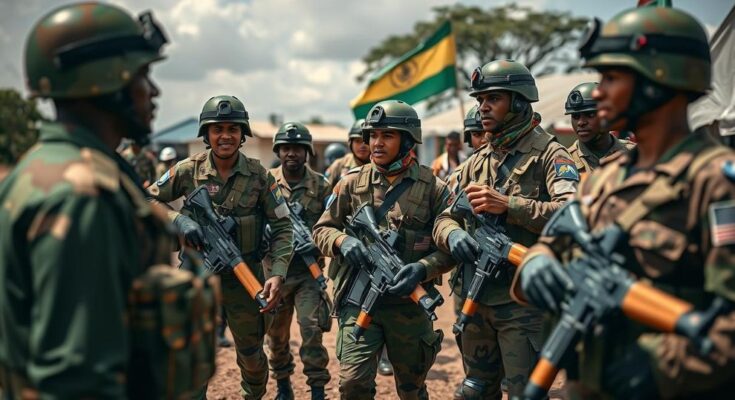Ethiopian forces detained six Somali National Army soldiers at Dolow airport after their arrival from Mogadishu, raising concerns about ongoing tensions regarding elections in Jubaland. The soldiers were in civilian attire, and the reasons for their arrest were unclear. Jubaland’s leaders are committed to holding indirect elections amidst pressures from the Somali federal government.
Ethiopian forces have detained six soldiers of the Somali National Army (SNA) at Dolow airport in the Gedo region, reportedly upon their arrival from Mogadishu. The soldiers were dressed in civilian clothing at the time of their apprehension, though the specific reasons for their detention remain unclear. Local reports suggest that this incident may relate to ongoing tensions involving the Somali government’s alleged attempts to obstruct the indirect elections being held in Kismayo, the capital of Jubaland. This tension has intensified in light of Jubaland’s security measures at Kismayo Airport, initiated in response to claims that President Hassan Sheikh Mohamud intended to deploy elite forces in a bid to disrupt these elections. Despite opposition from the federal government, Jubaland leaders, inclusive of Ahmed Madobe, are determined to proceed with the indirect elections, arguing that federal government proposals for universal suffrage threaten to extend the political terms unlawfully. Nepotism and regional power struggles underpin these political maneuvers, underlining the fragile state of governance in the region. Jubaland is already in the process of selecting lawmakers based on its electoral framework. Ethiopia has notably altered its stance towards Jubaland, demonstrating increased support for the region in contrast to its previous relations with Mogadishu. Furthermore, Somalia announced that Ethiopian troops would be withdrawing by December 2024, following a contentious agreement that granted Somaliland access to the sea through Ethiopia. Ethiopian military presence has been a pivotal aspect of the African Union Transition Mission in Somalia, with substantial deployments established to counter the threat of Al-Shabaab. The Somali administration has expressed its desire for Egyptian leadership in future stabilization forces instead of continuing reliance on Ethiopian military support.
The tensions between the Somali federal government and regional authorities, particularly Jubaland, have escalated, highlighting the complexities of governance in Somalia. The disagreement over electoral processes reflects deeper conflicts of interest between federal aspirations for uniform voting systems and regional commitments to maintain autonomy in governance. As Ethiopian forces navigate their changing role in Somalia and adjust their alliances, their interactions with Somali military factions significantly impact the region’s security landscape. The international community’s response, particularly to the withdrawal timeline of Ethiopian troops, signifies a broader geopolitical shift in East Africa’s security dynamics, especially with Egypt emerging as a key player in regional stability efforts.
In summary, the detention of Somali soldiers by Ethiopian forces accentuates the ongoing dispute surrounding elections in Jubaland, illustrating the fragile interplay of regional and federal authorities in Somalia. As Jubaland endeavors to maintain its electoral sovereignty against federal pressures, Ethiopia’s support signifies a pivotal shift in alliances. Furthermore, the impending withdrawal of Ethiopian troops introduces uncertainties about the future of security operations and governance in Somalia, with the nation poised to transition to new international partnerships.
Original Source: www.garoweonline.com




